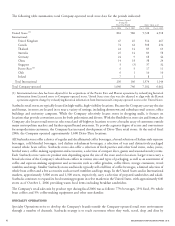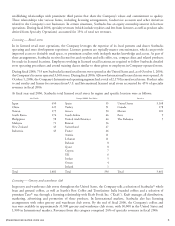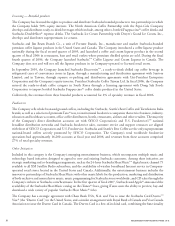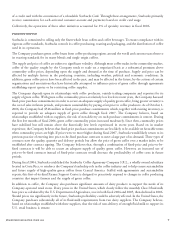Starbucks 2006 Annual Report Download - page 18
Download and view the complete annual report
Please find page 18 of the 2006 Starbucks annual report below. You can navigate through the pages in the report by either clicking on the pages listed below, or by using the keyword search tool below to find specific information within the annual report.and build market share in the specialty coffee market and the coffee market generally, it could harm the Company’s
business and financial results.
• Adverse public or medical opinions about the health effects of consuming the Company’s products could harm its business.
Some of the Company’s products contain caffeine, dairy products, sugar and other active compounds, the health effects of
which are the subject of increasing public scrutiny, including the suggestion that excessive consumption of caffeine, dairy
products, sugar and other active compounds can lead to a variety of adverse health effects. There has also been greater public
awareness that sedentary lifestyles, combined with excessive consumption of high-calorie foods, have led to a rapidly rising
rate of obesity. Particularly in the United States, there is increasing consumer awareness of health risks, including obesity, due
in part to increasing publicity and attention from health organizations, as well as increased consumer litigation based on
alleged adverse health impacts of consumption of various food products. While Starbucks has a variety of beverage and food
items that are low in caffeine and calories, an unfavorable report on the health effects of caffeine or other compounds present
in the Company’s products, or negative publicity or litigation arising from other health risks such as obesity, could
significantly reduce the demand for the Company’s beverages and food products.
• Significant increases in the market price or decreases in availability of high quality arabica coffee could harm the
Company’s business and financial results.
The supply and price of coffee are subject to significant volatility. Although most coffee trades in the commodity market,
high-altitude arabica coffee of the quality sought by Starbucks tends to trade on a negotiated basis at a substantial
premium above commodity coffee prices, depending on the supply and demand at the time of purchase. Supply and price
can be affected by multiple factors in the producing countries, including weather, political and economic conditions. In
addition, green coffee prices have been affected in the past, and may be affected in the future, by the actions of certain
organizations and associations that have historically attempted to influence prices of green coffee through agreements
establishing export quotas or restricting coffee supplies. Any significant increase in the market price or any significant
decrease in the availability of high quality arabica coffee could adversely affect the Company’s business and financial
results. Starbucks also purchases large quantities of dairy products — particularly milk. Any significant increase in the
market price or decrease in availability of dairy products could harm the Company’s business and financial results.
• Failure of the Company’s internal control over financial reporting could harm its business and financial results.
The management of Starbucks is responsible for establishing and maintaining effective internal control over financial
reporting. Internal control over financial reporting is a process to provide reasonable assurance regarding the reliability of
financial reporting for external purposes in accordance with accounting principles generally accepted in the United States
of America. Internal control over financial reporting includes maintaining records that in reasonable detail accurately and
fairly reflect the Company’s transactions; providing reasonable assurance that transactions are recorded as necessary for
preparation of the financial statements; providing reasonable assurance that receipts and expenditures are made in
accordance with management authorization; and providing reasonable assurance that unauthorized acquisition, use or
disposition of the Company assets that could have a material effect on the financial statements would be prevented or
detected on a timely basis. Because of its inherent limitations, internal control over financial reporting is not intended to
provide absolute assurance that a misstatement of the Company’s financial statements would be prevented or detected.
The Company’s rapid growth and entry into new, globally dispersed markets will place significant additional pressure on
the Company’s system of internal control over financial reporting. Any failure to maintain an effective system of internal
control over financial reporting could limit the Company’s ability to report its financial results accurately and timely or to
detect and prevent fraud.
Item 1B. Unresolved Staff Comments
Not applicable.
14 STARBUCKS CORPORATION, FORM 10-K
























